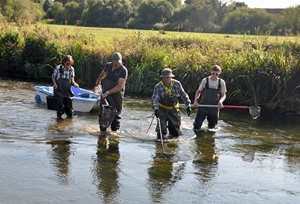Scientists and fisheries managers meet in France for International SAMARCH Forum
 Preliminary findings from tracking studies carried out by the SAMARCH research programme show that sea trout from France migrate to the UK coast and vice versa, and that individuals from both France and the UK are sharing similar marine feeding habitat. The results highlight the need for international management of sea trout at sea.
Preliminary findings from tracking studies carried out by the SAMARCH research programme show that sea trout from France migrate to the UK coast and vice versa, and that individuals from both France and the UK are sharing similar marine feeding habitat. The results highlight the need for international management of sea trout at sea.
The SAMARCH research is being shared at an international forum, Salmon and sea trout: scientific tools for their protection (Saumon & Truite de mer: des outils scientifiques au service de leur protection) taking place on 17 and 18 May 2022 in Pléneuf Val André (France). Over 120 international participants, focused on the management and protection of wild salmon and sea trout, are coming together at the event organised by Bretagne Grands Migrateurs.
The SAMARCH (SAlmonid MAnagement Round the Channel) programme is funded by the Interreg VA ‘France (Channel) England Programme’ for a period of seven years from 2017 to 2023. It aims to improve the management of salmon and sea trout populations in the Channel.
The forum brings together scientists and fisheries managers from France and England, in order to present the first results of the SAMARCH research programme and take stock of the current knowledge on salmon and sea trout in the rivers, estuaries and coastal areas between France and the UK.
Forum participants will also focus on the management and regulations that exist in the marine environment, and how the results from SAMARCH can be used to inform policy and management practices. Discussions will be used to develop recommendations that will maximise the potential of novel data collected by the SAMARCH partners, to protect and improve migratory salmonid stocks.
SAMARCH is a consortium of ten partners involved in scientific research and management, led by the Game & Wildlife Conservation Trust (GWCT), which aims to generate new knowledge on the biology and ecology of salmonids and to transfer this knowledge to improve regulations in France and the UK for the management of salmonids in estuaries and coastal areas. The ultimate aim is to help increase salmon and sea trout populations.
Gaëlle Germis, Directrice of Bretagne Grands Migrateurs, responsible for organising the forum, said: “We are delighted that all the partners of SAMARCH are present for this event in France. We are happy to welcome Prof. Ken Whelan, as well as all our Breton and Norman partners who work every day to manage and restore migratory salmonids. The exchanges that will take place during the discussions will enrich the debates on topics such as the restoration of ecological continuity in the coastal zone, offshore wind power, the supervision of professional and leisure fishing.”
Dylan Roberts, SAMARCH Project Manager and GWCT Head of Fisheries, said: “With stocks of Atlantic salmon and sea trout at critical levels across much of their natural range, it is crucial that we work together, to protect these fish. I am looking forward to two days of interesting debate over what is a very complex conservation area.”
The International SAMARCH Forum is also a featured event for World Fish Migration Day, whose main goal is to improve goal is to improve the public’s understanding of the importance of migratory fish and how we can reduce our impact on them.
Notes to editors
The Game & Wildlife Conservation Trust – providing research-led conservation for a thriving countryside. The GWCT is an independent wildlife conservation charity which has carried out scientific research into Britain’s game and wildlife since the 1930s. We advise farmers and landowners on improving wildlife habitats. We employ more than 60 post-doctoral scientists and other research staff with expertise in areas such as birds, insects, mammals, farming, fish and statistics. We undertake our own research as well as projects funded by contract and grant-aid from government and private bodies.
For information, contact:
Eleanor Williams
Telephone: 07592 025476
Email: press@gwct.org.uk